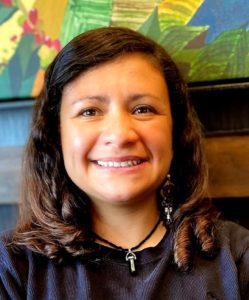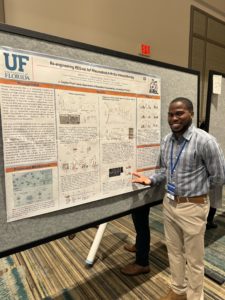The 22nd International Nanomedicine and Drug Delivery Symposium took place in Orlando, Florida, USA from 13–15 September 2024. Nanoscale Horizons, Nanoscale and Nanoscale Advances were delighted to support poster prizes at the event and we would like to congratulate our winners! You can find out more about the event in the overview on the NanoDDS website.
Learn more about our poster prize awardees below:
 Colin Basham (University of North Carolina, Chapel Hill, USA) Colin Basham (University of North Carolina, Chapel Hill, USA)
Poster Title: “Poly(2-oxazoline) Polymers to Improve Lipid Nanoparticle-Based Drug Delivery”
Colin Basham received his PhD from the University of Tennessee in Spring 2023 and is now a postdoctoral fellow in Dr. Kabanov’s lab at the University of North Carolina Chapel Hill. He studies how the replacement of PEGylated lipids with other polymers can reduce unwanted effects and enhance the targeting properties of lipid nanoparticles for drug delivery.
|
 Maria Rincon-Benavides (Ohio State University, USA) Maria Rincon-Benavides (Ohio State University, USA)
Poster Title: “Designed Extracellular Vesicles Loaded with NF1 Nucleic Acid as a Novel Therapeutic Strategy for Neurofibromatosis Type 1”
Maria Rincon-Benavides received a bachelor’s degree in biology science from the Universidad Distrital Francisco Jose de Caldas in Bogota, Colombia. Having recently graduated with a Ph.D in Biophysics at Ohio State University, Maria is a post-doctoral fellow at the biomedical engineering department at Ohio State University. Maria’s research primarily focuses on designing Extracellular Vesicles (EVs) as a therapeutic strategy for regenerative medicine, with main projects focusing on designing EVs as therapeutic agents for Neurofibromatosis type 1, lung therapies, lower back pain, brain inflammation, and skin ischemia. |
 Kevin Smith (University of Florida, USA) Kevin Smith (University of Florida, USA)
Talk Title: “Re-engineering REGvac for Rheumatoid Arthritis Immunotherapy”
Kevin Smith is a third-year PhD in the Lewis lab at the University of Florida. Kevin’s research focuses on the optimization of a regulatory vaccine to treat autoimmune diseases effectively. Due to global immunosuppression caused by current treatments for these diseases, patients are more susceptible to infectious diseases and malignancies. This vulnerability to infections amidst the current pandemic warrants special concerns for patients. With this reengineering, they seek to modify the phenotype of immune cells by utilizing biomaterial attributes and administering immune modulators. |













